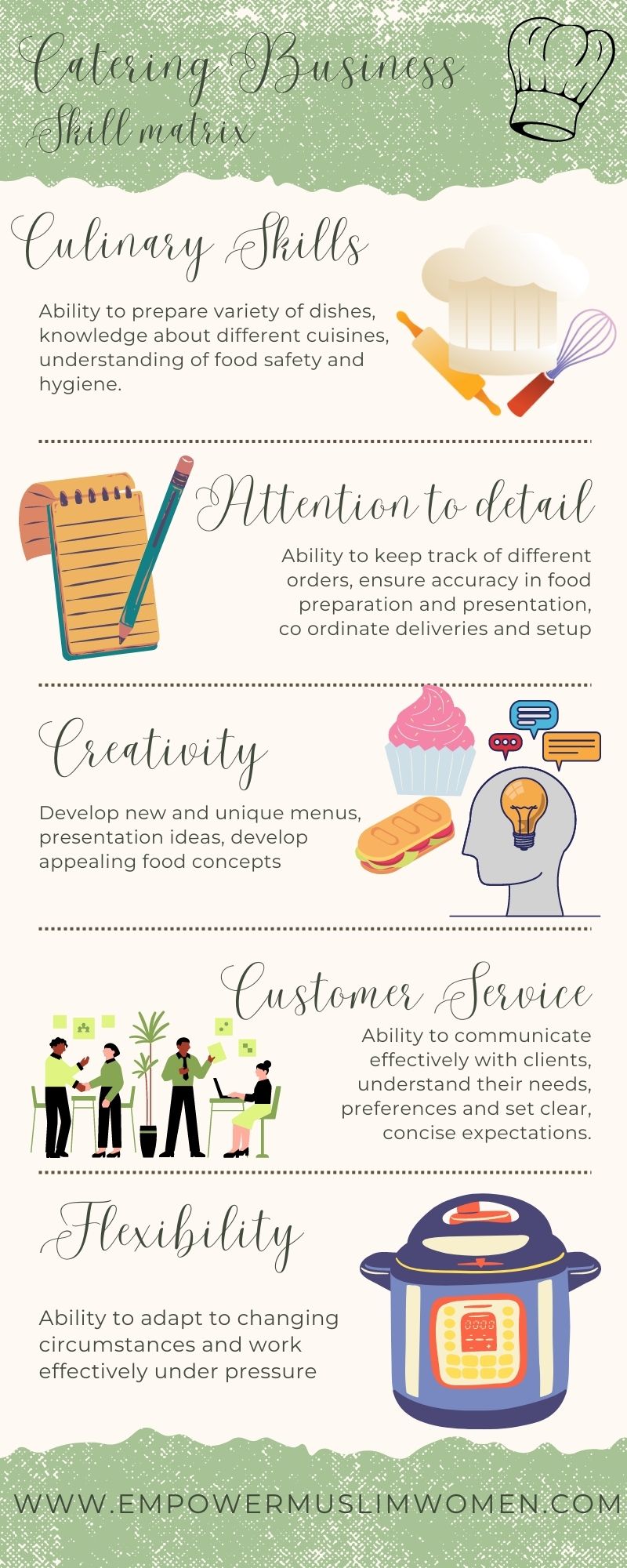Catering Services
Posted on April 27, 2023 • 4 minutes • 799 words
Starting a home-based catering business in Ontario requires a few steps to ensure that you comply with all legal and regulatory requirements.
The steps and requirements you need to follow to legally start a home-based catering business in Ontario:
- Obtain a Food Handler Certificate: All food handlers in Ontario are required to complete an approved food handler training program and obtain a Food Handler Certificate. You can obtain this certificate by taking an online course or attending an in-person training program.
- Register Your Business: You must register your business with the Ontario Ministry of Government and Consumer Services. This includes registering your business name and obtaining a Business Identification Number (BIN).
- Obtain Permits: Depending on the nature and scope of your business, you may require several permits, including a business permit, a zoning permit, and a health and safety permit. Contact your local municipality to determine which permits you need to obtain.
- Get Liability Insurance: It’s recommended to obtain liability insurance to protect your business from potential lawsuits.
- Set Up Your Kitchen: You must ensure that your kitchen complies with all relevant health and safety regulations. This includes having adequate ventilation, proper sanitation, and sufficient refrigeration and storage facilities.
- Label Your Products: You must label all products you sell with a list of ingredients and nutritional information.
- Follow Food Safety Regulations: You must comply with all food safety regulations, including proper food handling, storage, and preparation. In addition to the above, you may also need to comply with industry-specific regulations and obtain additional certifications, such as a Smart Serve Certification if you plan to serve alcohol.

Marketing the Catering business
- Build a Strong Online Presence: Create a listing that showcases your catering services, menu, and prices. Also, make sure to have a social media presence to promote your business and engage with potential clients. Use social media platforms such as Instagram, Facebook, and Twitter to post photos of your dishes, announce promotions, and keep followers updated on your business.\
- Offer Discounts and Promotions: Offer discounts and promotions to attract new clients and keep existing ones. You can offer discounts for referrals, first-time customers, and bulk orders. You can also run seasonal promotions or offer packages for special events like weddings, birthdays, or corporate events.
- Collaborate with Other Businesses: Collaborate with other businesses in your area to cross-promote your services. For example, you can offer catering services to a local event planning company or collaborate with a local restaurant to cater for their customers.
- Build Relationships with Clients: Building strong relationships with clients is key to a successful catering business. Always deliver quality food, excellent service, and follow-up with clients to ensure their satisfaction. Offer personalized services such as customized menus and take the time to understand your clients’ preferences and dietary restrictions.
- Advertise in Local Media: Advertise your catering business in local newspapers, magazines, and online publications. This can help you reach a wider audience and attract new customers to your business.
Startup costs
The startup costs for a small catering business serving 20 meals every day in Ontario can vary depending on a number of factors, but here are some potential costs you may need to consider:
- Licensing and Certification Fees: In Ontario, home-based catering operators are required to obtain a food handler’s certificate and a business license. These fees can range from a few hundred to a few thousand dollars.
- Kitchen Equipment and Supplies: You will need to purchase kitchen equipment and supplies, such as pots, pans, utensils, and serving dishes. Depending on the size of your business, this can cost anywhere from a few hundred to several thousand dollars.
- Ingredients and Food Supplies: You will need to purchase ingredients and food supplies to prepare your dishes. This cost will vary depending on the types of dishes you offer and the number of clients you serve.
- Transportation: Depending on your catering services, you may need to invest in transportation to deliver your food to clients. This can include purchasing a vehicle, renting a van, or using a delivery service.
- Marketing: You will need to invest in marketing to promote your catering service and attract new clients. This may include creating a website, printing business cards and flyers, and advertising in local media.
- Insurance: You may need to purchase liability insurance to protect your business in case of accidents or injuries.
Based on these factors, the estimated startup costs for a small catering business serving 20 meals every day in Ontario can range from approximately $5,000 to $15,000 or more. You can work on bringing down the costs by using existing equipment, car for transportation or offering only pickup and marketing only on Facebook local groups. The costs of obtaining licenses and certifications cannot be reduced and the insurance is mandatory for a legal business run from home.
